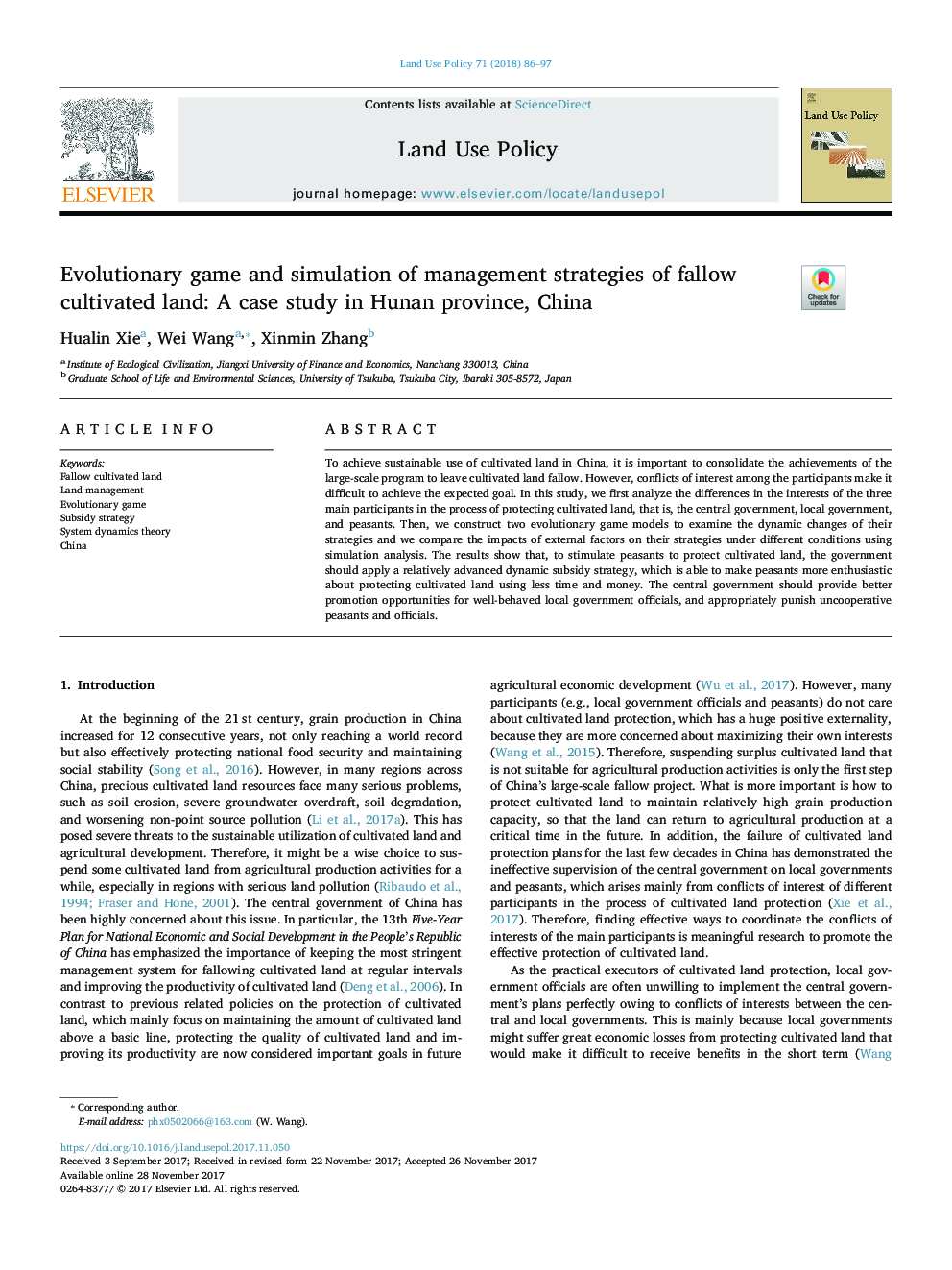| کد مقاله | کد نشریه | سال انتشار | مقاله انگلیسی | نسخه تمام متن |
|---|---|---|---|---|
| 6546600 | 1421812 | 2018 | 12 صفحه PDF | دانلود رایگان |
عنوان انگلیسی مقاله ISI
Evolutionary game and simulation of management strategies of fallow cultivated land: A case study in Hunan province, China
ترجمه فارسی عنوان
بازی تکاملی و شبیه سازی استراتژی های مدیریت اراضی کاشته شده: مطالعه موردی در استان هونان، چین
دانلود مقاله + سفارش ترجمه
دانلود مقاله ISI انگلیسی
رایگان برای ایرانیان
ترجمه چکیده
برای دستیابی به استفاده پایدار از زمین های کشت شده در چین، مهم است که دستاوردهای برنامه گسترده ای را برای ترک زمین های کاشته شده تحکیم کنید. با این حال، درگیری های منافع در میان شرکت کنندگان دشوار برای رسیدن به هدف مورد انتظار است. در این مطالعه ابتدا تفاوت های منافع سه شرکت کننده اصلی در فرآیند حفاظت از زمین های کشت شده، یعنی دولت مرکزی، دولت محلی و دهقانان، را تحلیل می کنیم. سپس، ما دو مدل بازی تکاملی را برای بررسی تغییرات پویا استراتژی های خود ساختیم و ما با استفاده از تحلیل شبیه سازی، اثرات عوامل خارجی بر استراتژی های آنها در شرایط مختلف مقایسه می کنیم. نتایج نشان می دهد که برای تحریک دهقانان برای حفاظت از زمین های کشت شده، دولت باید یک استراتژی نسبتا پیشرفته یارانه ی یارانه ای را که می تواند دهقانان را در حفاظت از زمین های کشت شده با استفاده از زمان و هزینه کمتر، اعمال کند، اعمال می کند. دولت مرکزی باید فرصت های ارتقاء بهتر را برای مقامات دولتی محلی به خوبی داشته باشد و به درستی مجازات دهقانان و مقامات غیر همجوار را می دهد.
موضوعات مرتبط
علوم زیستی و بیوفناوری
علوم کشاورزی و بیولوژیک
جنگلداری
چکیده انگلیسی
To achieve sustainable use of cultivated land in China, it is important to consolidate the achievements of the large-scale program to leave cultivated land fallow. However, conflicts of interest among the participants make it difficult to achieve the expected goal. In this study, we first analyze the differences in the interests of the three main participants in the process of protecting cultivated land, that is, the central government, local government, and peasants. Then, we construct two evolutionary game models to examine the dynamic changes of their strategies and we compare the impacts of external factors on their strategies under different conditions using simulation analysis. The results show that, to stimulate peasants to protect cultivated land, the government should apply a relatively advanced dynamic subsidy strategy, which is able to make peasants more enthusiastic about protecting cultivated land using less time and money. The central government should provide better promotion opportunities for well-behaved local government officials, and appropriately punish uncooperative peasants and officials.
ناشر
Database: Elsevier - ScienceDirect (ساینس دایرکت)
Journal: Land Use Policy - Volume 71, February 2018, Pages 86-97
Journal: Land Use Policy - Volume 71, February 2018, Pages 86-97
نویسندگان
Hualin Xie, Wei Wang, Xinmin Zhang,
